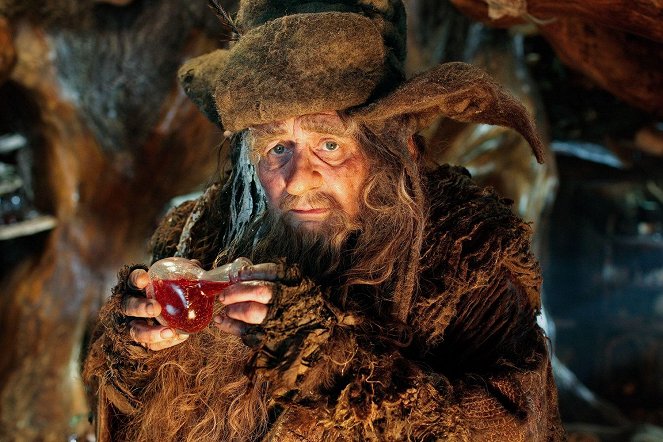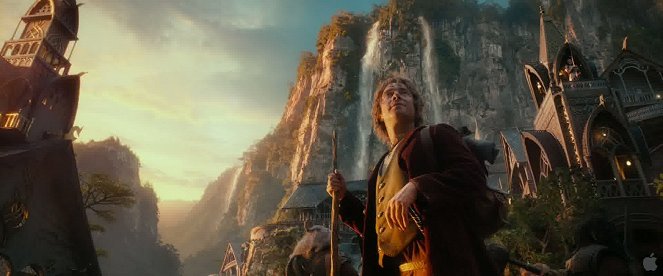Directed by:
Peter JacksonCinematography:
Andrew LesnieComposer:
Howard ShoreCast:
Martin Freeman, Ian McKellen, Richard Armitage, Ken Stott, Graham McTavish, William Kircher, James Nesbitt, Stephen Hunter, Dean O'Gorman, Aidan Turner (more)VOD (5)
Plots(1)
The first of three epic instalments in director Peter Jackson's blockbuster prequel to his Lord of the Rings' trilogy. Set in Middle-Earth 60 years before events in The Lord of the Rings, the story follows the adventures of Hobbit Bilbo Baggins (Martin Freeman), who, at the instigation of the wizard Gandalf (Ian McKellen), suddenly finds himself co-opted into joining a company of 13 Dwarves led by Thorin Oakenshield (Richard Armitage) to help reclaim the Dwarves' lost kingdom of the Lonely Mountain from the clutches of Smaug the dragon (voiced by Benedict Cumberbatch). After setting out on their quest from the safety of Bag End, the band of travellers soon find themselves pitted against a range of strange and fearsome opponents, in addition to a small, slimy creature known simply as Gollum (Andy Serkis). (Warner Bros. Home Entertainment)
(more)Videos (74)
Reviews (18)
I expected those weird people who in their free time dress as dwarves, elves and goblins and play at fighting in fields and forests to be excited about The Hobbit regardless of its quality, so I took the 86% rating with a pinch of salt and went to the cinema convinced that I wouldn’t give it more than two stars, and that I would regret it. This opinion was the result of the strange intention of the studio to stretch a slim book as much as possible, the bland trailers and, in particular, my negative experience with post-LotR Jackson (value for money, I think King Kong and Lovely Bones are the worst monstrosities Hollywood has produced in recent years). But that didn’t happen and here you have four stars (70%), and even though I’m not trembling in delight, it’s still a pleasant surprise. The Hobbit is nice eye candy with beautiful locations, a likeable protagonist and good special effects (by the most part). No more, no less. It’s hurt, though, by the weird attempt to blend the fairytale spirit of the book with the more adult character of Lord of the Rings. It rides on a similar nostalgic vibe as last year’s Expendables II, though this time it actually worked on me, because, unlike silly action flicks from the 80s, I do like Middle Earth. I will probably be one of the few who enjoyed more the first “boring” half, where the characters only talk and you can quietly soak in the atmosphere of The Shire (from the LotR trilogy, my favourite part is the beginning of The Fellowship of the Ring). The second half, good action notwithstanding, is an example of why I generally don’t like fantasy as a genre, and why sometimes I call it a parody of sci-fi. When the heroes get in trouble, the flexible rules of the fantasy world always allow from some bullshit deus-ex-machina to save them, and in the case of the ending The Hobbit, this is literal. 70%. PS: If I ever watch it again, I will have fun trying to count how many times one of the characters screams “Run”! And I will try to remember each dwarf other than by the colour of their hair and beards.
()
When it comes to fantasy, it’s all terribly simple. You just have to create a magical world for the viewer to fall in love with, pick characters that are quirky enough but not too quirky for the viewer to fall in love with, don't mess up the effects, compose masterful music that awakens the little kid in the viewer who longs for adventure every time he hears it, and then just come up with a really, really engaging story. If you can pull this off, even the girl who knew for sure that The Hobbit wasn't going to be for her will still be happy in the end. 4.5 stars.
()
Far over the Misty Mountains cold, To dungeons deep and caverns old, We must away, ere break of day, To seek our pale enchanted gold. Peter Jackson returned to Middle-earth and gave me a heartfelt gift that moved me from the first "Dear Frodo". No, I definitely won't be one of those who criticizes The Hobbit for being too much of a fairy tale compared to its more famous sequel, and simultaneously express how annoying it is that the plot, visuals, and everything else are connected or similar to the sequel. The book version of The Hobbit is a playful fantasy full of ideas and mysterious hints of what is happening or will happen in distant lands and times. And yet it was not made for a Hollywood adaptation, and despite being able to offer humor and adventure, it needed an additional factor. That factor arrived with the combination of The Lord of the Rings Appendices and Unfinished Tales. The result is the fulfillment of my dreams as a reader, the end of years of hoping and waiting, and above all, the story of three heroes. The guardian of Middle-earth, a stubborn dwarf leader, and a little hobbit who ran out without a handkerchief to live the greatest adventure of his life.
()
The Hobbit does not lend itself to forced conversion into a regular fantasy saga. It is, and always has been, a fairy-tale with a moral, and has never had greater ambitions than to be “just" a good bedtime story. And it is precisely out of this conflict between a fairy tale and an epic fantasy, which is not supported in the narrative structure of the original (or in the appendices), that friction points arise which Jackson does not always manage to smooth over. One moment it's a lovely quest exploring natural beauty, a scene later a fetish fantasy à la Warhammer full of slow-motion shots of muscled dwarves cutting off limbs like on an assembly line, followed by a return to a non-conflict idyll about misadventures on the road. You could probably read the initial six chapters that the first Hobbit movie works with faster than the nearly three hours that Peter devotes to them on the screen. Moreover, PJ opted for an unfortunate stylization to an unacknowledged remake of the Fellowship of the Ring; as if he'd stretched out the Fellowship from one movie into three and interspersed it with great CGI action escapades like in his King Kong. But the best scenes here are the simple ones based purely on actors (led by riddles in the dark). You can clearly see here which of the scenes would end mercilessly on the cutting room floor in the original two-part concept. However, none of the above means that it is not a good movie anyway. Because it is good cinema, plain and simple. Nor is my satisfaction spoiled by the fact that someone else should have taken over from Jackson; perhaps Cuarón or del Torro, because this cut was created for fans and not for a regular audience. However, it is probably clear from the score I gave it which category I belong in, despite all these criticisms; I've been enjoying it since the second screening with a stupid smile on my face, no matter what reason says… The extended version performs a similar function as it did with The Fellowship; that is, an interesting and pleasant expansion. But you won't miss anything if you don't see it. With one exception (a completely reworked Rivendale; especially the night passage), it contains nothing fundamental. It's definitely not an editorial revision that changes one's experience like the longer version did with The Two Towers. A very technical P.S.: HFR 48 fps really is precisely as (r)evolutionary as claimed and is partly changing the way film media is perceived. However, due to its clarity, sharpness, fluency and detail, it is completely unforgiving of filmmaking mistakes/effects and is therefore not suited to films where props, sets and masks play first fiddle. It spoils the cinematic illusion because you can clearly see "where the glue for the dwarf's beard ends" and that "boulder is a painted prop". It also does not work with dubbing since in a normal picture, the dubbing artist can speak to the movement of the actor's mouth, but here every little lip movement of every word can be seen, and it will no longer pass unnoticed -- a rather bizarre impression arises when the visual of the mouth clearly says something different than what you hear. Of course, HFR as such is life-like, immediate, but a bit like being at theatre. However, in non-studio shots of (not only) landscapes or purely CGI moments, HFR is breathtaking, and, for example, for nature documentaries, sports broadcasts, or CGI spectacles, holds indisputable promise for the future. There are undeniable positives, but there are negatives as well, and The Hobbit allows you to feel both fully.
()
(less)
(more)
"Set time" in Middle-earth - I can't think about this film in any other way. A prequel for something that doesn't need a prequel, a film that has a hard time finding its pace, a film that can't shake off the specter of the overly strenuous imitation of the Lord of the Rings trilogy, a film whose characters, despite almost three hours, act like Bilbo, Gandalf, Thorin and a chubby bunch of blabbering beards (moreover, I'm not quite sure if the step of giving Thorin the position of Aragorn was successful). Since The Return of the King, Jackson seems to me to be lost in a pastel-filled imagination - after the third sunset / sunrise, I have no doubt that what was "beautiful and epic" in the original trilogy is more self-serving and kitschy here (this also applies to the depressing flights, which are supposed to confirm to us "that it's here again and it's as big as an orc double chin"). Still, I'm not overly disappointed. Partly because I didn't expect anything else. Particularly because Tolkien's book was not particularly hurt by the powerful thickening of the "additional" storylines, although the best moments for me are equally identical to those of the books (puzzles in the dark, the Song of Durin's People). In some cases it is a mirror reflection of The Fellowship of the Ring (for example composition: the historical "battle" introduction // the exposition in Middle Earth // the diplomatic interlude in Rivendell // the action mess in the depths, but there are more such connections), while in some case it is its opposite (while The Fellowship of the Ring cut and dynamized, the Hobbit rather stretches and retards with retrospectives and explanations). I can't shake the impression that the original trilogy looked "more cinematic" thanks to a smaller share of digital accessories, and thanks to that it also functioned as "good epic theater". The Hobbit did not give me this feeling even during the eloquent speeches in Rivendell. No, I'm definitely not annoyed, but if I was anxiously waiting to see if the division of the film into three parts made much sense, I have no greater reason to say YES after today. The rating applies to the 3D version with dubbing and hovers a "bit" over three stars. But just a little bit. Edit: not even the original version convinced me. For me, the film between the poetic introduction and the action finale contains an awful lot of dramatically staged rubbish, which did not draw me into its depths for even a moment like any (cut out) scene in The Fellowship of the Ring. It is wide, so I'm wondering if all those dialogic retardations and hinted storylines will be beneficial later.
()
Gallery (238)
Photo © New Line Cinema, Metro-Goldwyn-Mayer, Warner Bros. Pictures / James Fisher, Mark Pokorny



Ads